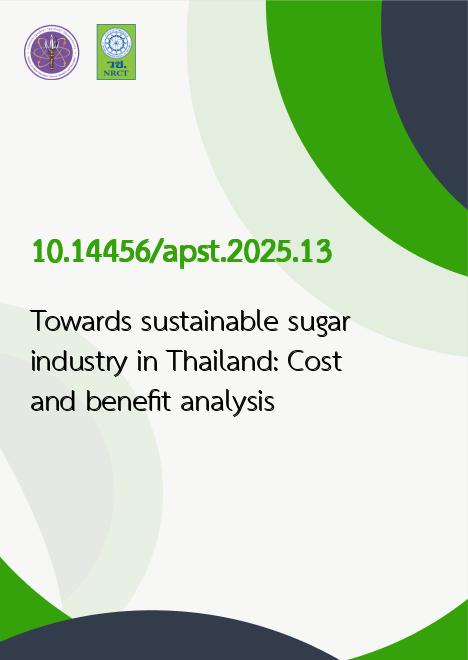
|
Towards sustainable sugar industry in Thailand: Cost and benefit analysis |
|---|---|
| รหัสดีโอไอ | |
| Creator | Suphaphat Kwonpongsagoon |
| Title | Towards sustainable sugar industry in Thailand: Cost and benefit analysis |
| Contributor | Russamee Junkraweekoon, Kanokwan Kingphadung |
| Publisher | Asia-Pacific Journal of Science and Technology |
| Publication Year | 2568 |
| Journal Title | Asia-Pacific Journal of Science and Technology |
| Journal Vol. | 30 |
| Journal No. | 1 |
| Page no. | 13 (14 pages) |
| Keyword | Sustainable, Industry, Sugarcane, Sugar, Waste management, Cost, Benefit, Benefit-cost ratio (BCR) |
| URL Website | https://so01.tci-thaijo.org/index.php/APST/ |
| Website title | https://so01.tci-thaijo.org/index.php/APST/article/view/268882 |
| ISSN | 2539-6293 |
| Abstract | This study analyzes the financial costs and benefits associated with various agricultural practices, industrial processes, products, byproducts and waste management, starting from sugarcane plantations to the end users of products and byproducts of sugar processing. The field survey and data collection were conducted using face-to-face interviews during the 2020/21 crop year. The findings indicate that the total variable sugar production cost of the entire industry is 864 USD per ton of raw sugar crystal, with 77% coming from sugarcane production and 23% from the sugar production process. The highest cost of sugarcane production was in the weed control process, accounting for 38%, followed by fertilizer application, planting, sugarcane transported to the mill, harvesting, and others (land preparation, insecticide control and crop maintenance) at 24, 14, 11, 8 and 5%, respectively. The findings of Benefit-Cost Ratio, Net Present Value, and Internal Rate of Return analysis indicate that for the process of cane production and the entire sugar industry, the benefit category I, by using three main byproducts: 1) selling molasses for other uses or production; 2) selling filter cake as fertilizer, and 3) using bagasse as fuel to generate electricity, is the most economically feasible. Although all profits are returned only to the sugar factory, using these byproducts and wastes can bring enormous environmental benefits. Moving towards a sustainable sugar industry in Thailand, a need exists to improve sugarcane production by reducing production costs, e.g., reducing inputs such as chemicals, fertilizer and fuels, and increasing sugarcane productivity. |
